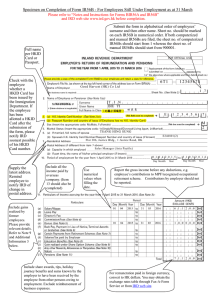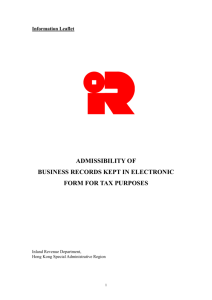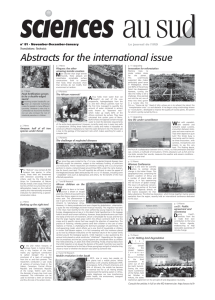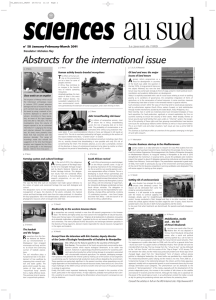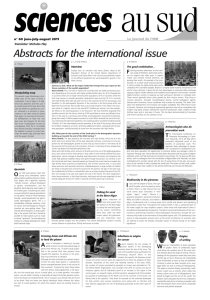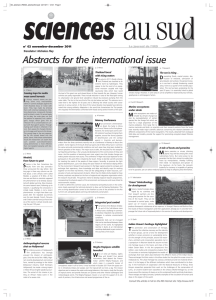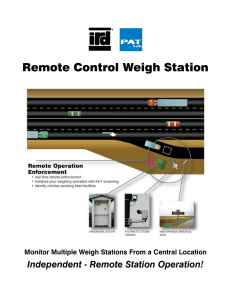Editorial introduction
advertisement
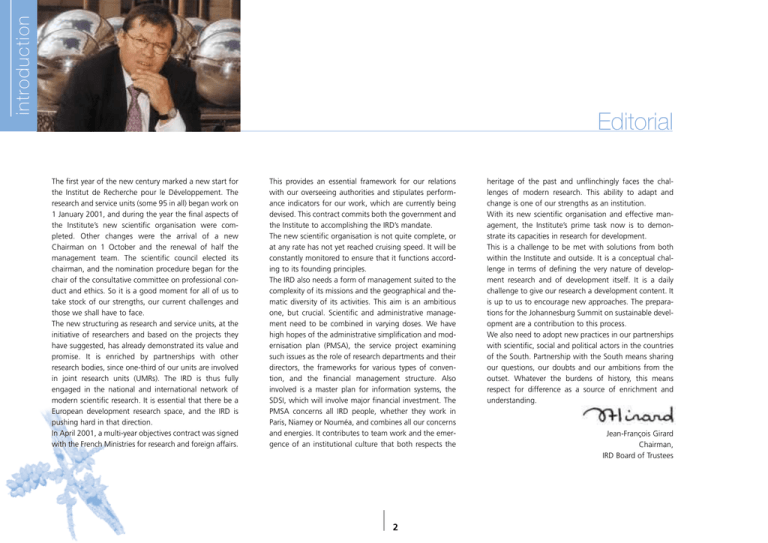
introduction Editorial The first year of the new century marked a new start for the Institut de Recherche pour le Développement. The research and service units (some 95 in all) began work on 1 January 2001, and during the year the final aspects of the Institute’s new scientific organisation were completed. Other changes were the arrival of a new Chairman on 1 October and the renewal of half the management team. The scientific council elected its chairman, and the nomination procedure began for the chair of the consultative committee on professional conduct and ethics. So it is a good moment for all of us to take stock of our strengths, our current challenges and those we shall have to face. The new structuring as research and service units, at the initiative of researchers and based on the projects they have suggested, has already demonstrated its value and promise. It is enriched by partnerships with other research bodies, since one-third of our units are involved in joint research units (UMRs). The IRD is thus fully engaged in the national and international network of modern scientific research. It is essential that there be a European development research space, and the IRD is pushing hard in that direction. In April 2001, a multi-year objectives contract was signed with the French Ministries for research and foreign affairs. This provides an essential framework for our relations with our overseeing authorities and stipulates performance indicators for our work, which are currently being devised. This contract commits both the government and the Institute to accomplishing the IRD’s mandate. The new scientific organisation is not quite complete, or at any rate has not yet reached cruising speed. It will be constantly monitored to ensure that it functions according to its founding principles. The IRD also needs a form of management suited to the complexity of its missions and the geographical and thematic diversity of its activities. This aim is an ambitious one, but crucial. Scientific and administrative management need to be combined in varying doses. We have high hopes of the administrative simplification and modernisation plan (PMSA), the service project examining such issues as the role of research departments and their directors, the frameworks for various types of convention, and the financial management structure. Also involved is a master plan for information systems, the SDSI, which will involve major financial investment. The PMSA concerns all IRD people, whether they work in Paris, Niamey or Nouméa, and combines all our concerns and energies. It contributes to team work and the emergence of an institutional culture that both respects the 2 heritage of the past and unflinchingly faces the challenges of modern research. This ability to adapt and change is one of our strengths as an institution. With its new scientific organisation and effective management, the Institute’s prime task now is to demonstrate its capacities in research for development. This is a challenge to be met with solutions from both within the Institute and outside. It is a conceptual challenge in terms of defining the very nature of development research and of development itself. It is a daily challenge to give our research a development content. It is up to us to encourage new approaches. The preparations for the Johannesburg Summit on sustainable development are a contribution to this process. We also need to adopt new practices in our partnerships with scientific, social and political actors in the countries of the South. Partnership with the South means sharing our questions, our doubts and our ambitions from the outset. Whatever the burdens of history, this means respect for difference as a source of enrichment and understanding. Jean-François Girard Chairman, IRD Board of Trustees The IRD around the world Sweden United Kingdom Belgium Switzerland See page 37 for IRD establishments in France. Tunisia United States Lebanon Morroco Senegal Senzgal Mexico Mali Colombia Martinique Carribean French Guiana Guinea Ecuador Brazil Peru India Niger Guadeloupe Costa Rica French Polynesia Egypt China Syria Israel Côte d’Ivoire d'Ivoire Thailand Burkina Ethiopia Faso Central African Republic Benin Kenya Sri Lanka Togo Congo Seychelles Indonesia Vanuatu Cameroon Madagascar Bolivia Paraguay La Réunion Chile Staff South Africa 200 Tenured staff Senegal : Establishments 60 30 Local staff United States: Other allocations 1 Staff breakdown at 31 December 2001 3 New Caledonia





